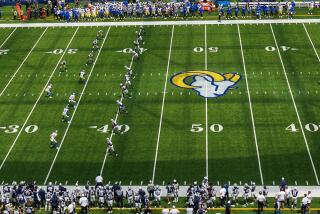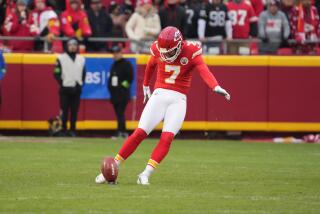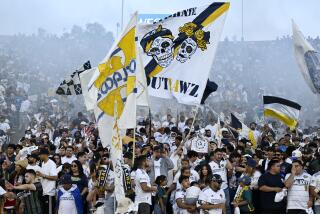NFL Winter Meetings : Too Noisy Cheering Will Bring Penalties
- Share via
PALM DESERT — If you’re planning to see a pro football game next fall, be careful when and how you cheer, and how long. And how loud.
Noticeably noisy cheering--at the wrong time--could bring a penalty of 50 yards or more against the home team.
The owners of the 28 National Football League clubs decided that at the winter meetings at Palm Desert Tuesday, when they empowered their officiating crews to penalize teams for overzealous crowds.
Referees were authorized to confiscate timeouts or, if necessary, walk off penalties against teams whose cheering fans raise the noise level to a pitch that disrupts the other team’s communications.
At the Seattle Kingdome, for instance, visiting quarterbacks have for years complained that their teammates often couldn’t hear the signals in the din.
But until now, the NFL has maintained that anti-rabble legislation was impossible.
As Tex Schramm of the Dallas Cowboys, chairman of the league’s competition committee, used to say: “You can penalize teams and players--but not crowds.”
Tuesday’s legislation--approved by a 21-7 vote--was unprecedented.
Said Ram Coach John Robinson: “It isn’t a bad precedent to ensure the normal functioning of a game. The colleges have a rule like this.”
The NFL rule provides for an unlimited number of yards penalized. Although football teams and players can be penalized a maximum of 15 yards for even the most flagrant foul, a crowd that refuses to quiet down could draw a penalty of 50 or 90 yards or even more.
“Eventually (from the five-yard line in) it would be only half the distance of the field,” Schramm said. “So you could never score a touchdown (on the penalty).”
Two competition committee spokesmen, Schramm and Miami Coach Don Shula, outlined a three-step, noisy-stadium procedure:
--The referee will first advise the fans and the defensive players that there will be a penalty unless the clamor abates.
If it doesn’t, he will take away one or more timeouts--assuming the home team hasn’t used them all.
--Then he will penalize the home team five yards at a time as long as necessary.
“Hopefully, one lost timeout, or one penalty, will be enough,” Schramm said. “The timeouts will go first because most coaches would rather take a penalty than lose a timeout.” Shula, representing the coaches, approved of the rule.
“The offenses are so sophisticated now that they can operate with hand signals in a noisy stadium,” he said. “But the problem is that this limits what you can do.”
The NFL conceded that the rule violates the free speech amendment to the U.S. Constitution.
“There’s a slight infringement,” Schramm said.
In recent years, however, many sports fans have breached the same precept.
“They have prevented the offensive teams from being able to communicate,” Shula said.
The league’s battle against fake injuries took the form of a statement by the competition committee, unopposed by the convention, recommending fines and suspensions--and in serious cases loss of draft choices--for clubs, coaches and even physicians.
Two members of the committee, Schramm and Shula, urged the NFL’s referees to assume that in any instance, a stricken player is injured, even if he has taken two or three previous dives, but to put in motion strong disciplinary measures if they “sense a pattern” of abuse.
The statement was a response to a widely publicized incident last year when the Seattle Seahawks were accused of faking injuries six times in one game to foil the Cincinnati Bengals’ no-huddle offense.
That offense is entirely legal, the competition committee ruled, supporting Commissioner Pete Rozelle’s position.
Will a mere statement slow the feigning of injuries?
“I think this will stop it,” Schramm said.
The league also modified its rule against roughing the passer, enjoining rushers from heading for a quarterback’s knee when they have a clear path in.
The new language is designed to prevent attacks such as that of Philadelphia’s Andre Waters on the Rams’ Jim Everett last year.
Waters said afterward that he got the only part of Everett he could reach. And to some observers, that’s the way it looked.
Among others on the competition committee, Shula, however, disagreed.
“He was obviously going for the knee,” Shula said.
More to Read
Go beyond the scoreboard
Get the latest on L.A.'s teams in the daily Sports Report newsletter.
You may occasionally receive promotional content from the Los Angeles Times.










